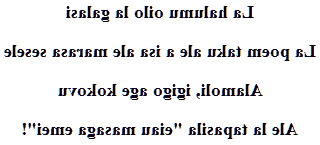Nakanai love poem
La halumu oilo la galasi
La poem taku ale a isa ale marasa sesele
Alamoli, igigo age kokovu
Ale la tapasila "eiau masaga emei"!
Perhaps, there is no word for poem, so Jane has let the English word!


→ French poem ←
The nakanai
Here the tanslation of my love poem into nakanai (other names : Lakalai, Nakonai, and dialects names : Vele, Loso, Mamuga, Auka, Vere, Tarobi, Babata, Muku, Bileki, Ubae, Maututu, Losa).
Nakanai is the Austronesian Malayo Polynesian language of the Muku (Muu) populations, found in the west of the province of New Britain, in the Hoskins district, on the side of the Nakanai mountains, Cape Hoskins, Commodore Bay, Bangula Bay, Cape Reilnitz and Cape Koas, in Papua New Guinea.
The different dialects are spoken in more than forty villages, with a good degree of mutual intelligibility. The translation here is exactly in Bileki, the name given by the natives, to the western region of the Nakanai linguistic area.
Bileki is the most western dialect and the one that has the greatest number of speakers, it is also the one that is most in contact with the centers in relation with the outside, and in general speakers of other dialects can understand it.
There would be around 15,000 people to speak one of the dialects of Lakalai, a neighboring language of Melamela, since the similarity between these two languages would be 65%.
The lakanai (nakanai) who did not know the phoneme "n", integrated it in the contact with English, and the language borrowed many words from the pidgin.
Nakanai is a language which in terms of prestige ranks just after Tolai among the vernaculars languages of New Britain.
It also seems important for me to note that often throughout Papua New Guinea there is a high rate of multilingualism, which has been the answer to communication problems related to the linguistic diversity of the country, so it is common to have the practice of 4 or 5 languages.
Indeed, many language groups have only a few hundred speakers, so it is practically impossible for people to get married inside their onw group.
As a result, most children have parents who speak differents languages, and as they grown up they may acquire more in communication with relatives from other groups. Adults, with the commercial networks, acquire the language of their partner, and bring out simplified vehicular languages, such as simplified motu.
New Britain
New Britain, is a large island of Bismark archipelago, between the Solomon islands in the east, and the main island of Papua New Guinea in the west.
Two Dutch Le Maire and Schouten, followed by Abel Tasman, another Dutchman, in the 17th century are the first to set foot in New Britain.
In the 19th century, the Germans colonized the province, but mainly confined themselves to exploring the Gazelle peninsula, and the Nakanai area remained a terra incognita.